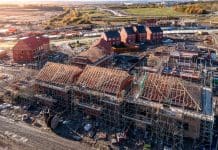‘Shameful’ removal of fire safety from professional indemnity insurance leaves building owners uninsured in Grenfell aftermath, warns Ingleton Wood
Ingleton Wood has raised concerns over fire safety issues being increasingly excluded from professional indemnity insurance policies following the Grenfell Tower inquiry.
These exclusions are leaving building owners such as schools, hospitals and businesses at risk of being uninsured.
Ingleton Wood has launched a campaign to tackle “shameful” so-called ‘fire carve-outs’ or policy exemptions which the firm says are becoming increasingly common in the professional indemnity (PI) market.
Ingleton Wood is calling on the government to take urgent action such as underwriting the policies to ensure all consultancies are comprehensively insured, including for fire-related inspections and designs.
Consultants and professionals in the construction industry take out PI insurance to cover the cost of negligence claims that clients could make against them if an incident – such as a building fire – was caused by an error in design or a failure in specification.
The pressure of the Grenfell Tower tragedy inquiry has caused many underwriters to leave the PI insurance market due to higher risks, such as cladding.
As a result, insurers are hiking up premiums or reducing the amount of cover provided.
Fire carve-outs are ‘shameful documents’
The Royal Institute of British Architects (RIBA) has acknowledged PI cover is “becoming more and more challenging” and has pledged to help the industry tackle the issue.”
David Cresswell, partner at Ingleton Wood, said: “We are very concerned about the rising prevalence of fire safety exclusions in professional indemnity policies.
“Fire carve-outs are shameful documents and essentially mean consultants would be uninsured for any passive or active fire issues, retrospectively as well as in the future.
“As we understand it, many other consultants are taking reduced cover as they simply cannot afford the full cover. This is a hugely damaging position for the industry and will no doubt have wider ramifications for building owners and occupiers.
“The built environment relies on competent consultants to apply the regulations in order to safeguard us all.
“It is therefore time for the government to step in with greater regulation or, even better, to underwrite the insurance itself.
“We are also lobbying local MPs, industry regulators and other stakeholders to help tackle this very serious issue.”














